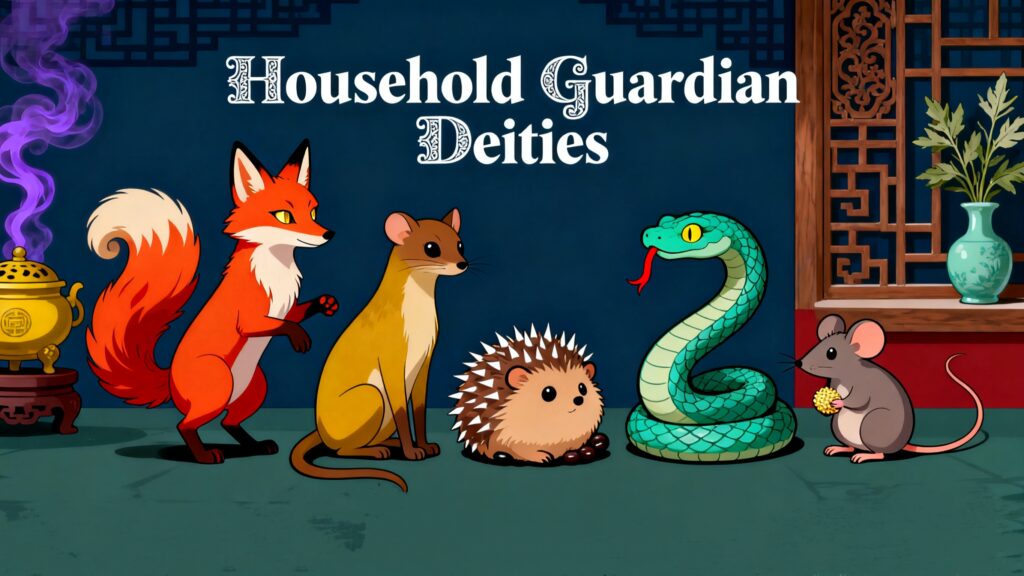
Introduction
In the folk traditions of northern China, particularly in the northeast, people have long believed in a group of protective spirits known as household guardian spirits. These spirits are thought to safeguard the home, ensure family prosperity, and ward off misfortune. Unlike Buddhism or Daoism, this belief is not part of a formal religious system but rather a community-based folk practice shaped by local culture, animism, and shamanic influences.
Origins and Formation
The household guardian spirit tradition emerged from several overlapping sources:
Animism and Animal Worship
Ancient people believed that all living beings possessed spiritual power, and certain animals became revered as divine protectors.
Shamanic Influence
In the northeast, the Manchu and Tungus shamanic traditions emphasized communication with spirits, which deeply influenced local beliefs.
Syncretism with Buddhism and Daoism
Over time, elements of Buddhist compassion and Daoist ritual practices merged with folk customs, enriching the tradition.
Family Bonds and Reciprocity:
Many stories tell of families being blessed after helping an animal spirit, forming a bond that lasted for generations.
Community Transmission:
Villages established altars, rituals, and rules that formalized the practice, spreading it across northern China.
The Five Main Guardian Spirits
The most representative household guardians are collectively known as the “Five Spirits”—Hu, Huang, Bai, Liu, and Hui (Fox, Weasel, Hedgehog, Snake, and Rat). Each has unique qualities:
Fox Spirit (Hu)
Symbol of wisdom and protection. Believed to remove disasters, bless careers, and guide scholars.
Weasel Spirit (Huang)
Associated with wealth and authority. Thought to drive away evil and attract prosperity.
Hedgehog Spirit (Bai)
Known as a healer. Said to cure illnesses, especially difficult or unexplained conditions.
Snake Spirit (Liu)
Guardian of the household, suppressing evil influences and ensuring peace.
Rat Spirit (Hui)
Linked to fortune and foresight. Its presence suggests abundance, since plentiful grain attracts mice.
Worship Practices
Families often honor guardian spirits through daily or seasonal rituals:
- Household Altars: A small shrine with a plaque or image placed in the main hall or storeroom.
- Offerings: Incense, fruits, wine, and meat to express respect and gratitude.
- Seasonal Rituals: Certain days of the lunar calendar were considered more auspicious for offerings.
- Regional Variations: Some communities placed particular emphasis on the fox and weasel, giving them higher status.
Popular Legends and Stories
Folk legends keep the tradition alive through storytelling:
- Fox Spirit Rewarding Kindness: A family that once rescued a fox later received guidance and prosperity from its spirit.
- Weasel Spirit’s Trial: A weasel on the path to spiritual transformation might ask, “Do I look like a human?” A correct answer brought blessings; a wrong one could bring misfortune.
- Hedgehog Spirit Healing: Appearing as “Old Lady White,” the hedgehog spirit was said to cure difficult illnesses or aid in childbirth.
- Snake Spirit as Protector: Families believed that household snakes were guardians who drove away pests and evil spirits.
- Rat Spirit and Wealth: The presence of mice around stored grain was interpreted as a sign of abundance and prosperity.
These stories carried moral lessons, teaching that kindness brings rewards, while disrespect or harm toward the spirits may invite disaster.
Cultural Role and Boundaries
Household guardian spirits play a unique role in Chinese folk culture:
- Function: Primarily protect the home and family, rather than serve as mediums for fortune-telling or shamanic practice.
- Cultural Status: A folk belief rather than part of Buddhism or Daoism.
- Rational Perspective: While healing or possession stories exist, they are better understood as cultural narratives rather than scientifically proven events.
- Community Identity: The tradition reflects northern Chinese values of family, reciprocity, and respect for unseen forces.
Conclusion
Household guardian spirits represent the deep connection between families and the unseen world in northern Chinese folk culture. They embody the values of protection, gratitude, and reciprocity, serving not only as spiritual protectors but also as symbols of community memory and moral guidance.